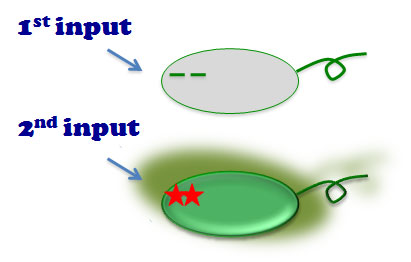Team:Chiba/Project
From 2010.igem.org
(→Overall Project) |
(→Requirement of Double Click) |
||
| Line 268: | Line 268: | ||
<br><br><br> | <br><br><br> | ||
| - | ===<font size="5"> | + | ===<font size="5">The Bottom Line is...</font>=== |
| - | + | #If there is only an input, nothing happens. | |
| - | #If there is | + | #Duration of the input is not the matter. The circuit cares only the number of input. |
| - | # | + | #However, a certain time after the 1st input, it returns to the initial state. |
| - | # | + | #Giving two inputs in the limited time the circuit get activated (gives output). |
| - | # | + | |
Revision as of 02:10, 28 October 2010

Double Click Bacteria
If there are two-time input in fixed time, bacteria is going to shine.
Double Click System
|
We’re inspired by double-click of computer’s mouse. It doesn’t react by first input but react by second input. So we designed bacterial DNA sequence which works like it. Furthermore, we built time-limit in genetic sequence between the first and the second input like a computer mouse. Bacteria which have the DNA sequence can distinguish between the first input and the second one. Once in a while, bacteria might receive input which wasn’t intended. But it was the first input so bacteria don’t react. Even if there was input not intended, bacteria don’t react unless the second input is entered. Moreover, when the limit-time which controlled by the genetic system is passed, the system is going to return to the initial state. So we expect this DNA sequence will work as a safety device. |
The Bottom Line is...
- If there is only an input, nothing happens.
- Duration of the input is not the matter. The circuit cares only the number of input.
- However, a certain time after the 1st input, it returns to the initial state.
- Giving two inputs in the limited time the circuit get activated (gives output).
 "
"
